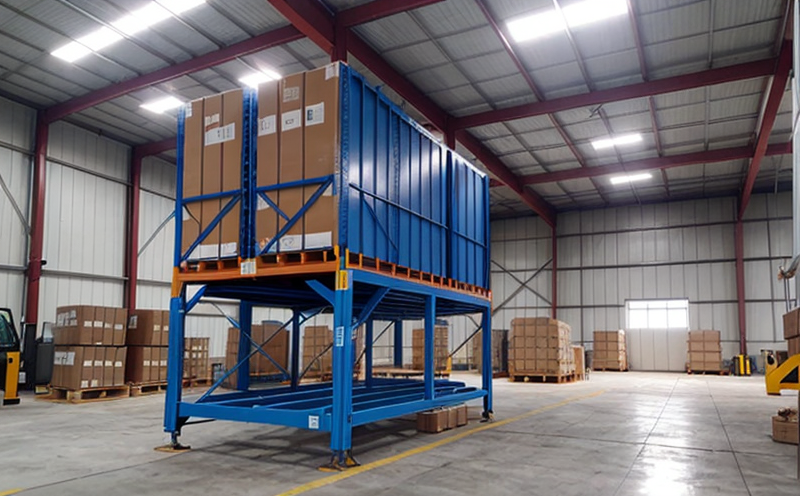Palletizing system inspection
The palletizing process is a critical aspect of material handling and logistics. Efficiently stacking goods on pallets ensures product integrity, reduces damage during transport, and optimizes space in storage facilities. However, the introduction of automated systems has added layers of complexity. Palletizing systems must be meticulously inspected to ensure they meet specific performance criteria and regulatory standards.
The inspection process involves several key steps aimed at verifying that palletizing equipment operates safely and reliably. This includes checking for mechanical integrity, ensuring proper alignment, validating the accuracy of weight distribution, and confirming adherence to safety protocols. Compliance with international standards such as ISO 4482 (for quality control) is essential.
Quality managers and compliance officers play a vital role in overseeing these inspections. They ensure that equipment meets not only current regulations but also future-proof design considerations. R&D engineers leverage this information to refine existing technologies, while procurement teams focus on selecting reliable suppliers for new equipment.
The use of advanced inspection techniques is crucial in identifying potential issues before they become critical failures. This can involve visual inspections complemented by non-destructive testing methods like ultrasonic or radiographic examination. These tests help detect hidden flaws that might otherwise go unnoticed during routine operations.
Furthermore, regular calibration and maintenance schedules are necessary to keep equipment running smoothly over its service life. Proper documentation of each inspection is also important for traceability purposes, allowing stakeholders to track changes over time.
In summary, thorough palletizing system inspections serve multiple objectives: enhancing operational efficiency, improving product quality, ensuring worker safety, and maintaining regulatory compliance. By focusing on these aspects, organizations can maximize the benefits offered by modern automated systems while minimizing risks associated with improper usage or neglect.
Why It Matters
The importance of palletizing system inspections cannot be overstated. Properly functioning equipment ensures that goods are handled safely and efficiently throughout their supply chain journey. Any malfunction can lead to costly downtime, increased operational costs, or even accidents.
From a business perspective, reliable palletizing systems enhance customer satisfaction by delivering products on time and undamaged. This contributes positively towards brand reputation and long-term relationships with clients. Moreover, adhering strictly to safety guidelines reduces the likelihood of incidents resulting in fines or legal liabilities for companies involved in non-compliance.
On a broader scale, robust inspection practices contribute significantly to environmental sustainability efforts. Efficiently managing resources through optimized palletizing minimizes waste generation and energy consumption associated with unnecessary rework or product loss due to poor handling methods.
In conclusion, investing time and effort into regular inspections pays dividends in terms of improved productivity, reduced risk exposure, enhanced reputation, and sustainable practices. It is an investment that every organization operating within the logistics sector should prioritize.
Eurolab Advantages
At Eurolab, we pride ourselves on offering comprehensive palletizing system inspection services tailored specifically to meet the unique needs of our clients. Our team consists of highly experienced professionals who stay abreast of latest developments in this rapidly evolving field.
- Comprehensive Assessments: We conduct thorough evaluations covering all critical components of palletizing systems, ensuring nothing is overlooked.
- Advanced Technologies: Leveraging cutting-edge inspection tools allows us to identify subtle issues that may otherwise remain undetected.
- Regulatory Compliance: Our expertise ensures that inspections adhere strictly to relevant international standards like ISO 4482, providing peace of mind regarding regulatory adherence.
- Custom Solutions: Recognizing the diverse requirements across various industries, we offer customized inspection protocols designed specifically for your organization's unique circumstances.
- Expert Advice: Beyond mere inspections, our consultants provide valuable insights into best practices and potential improvements that could enhance overall performance further.
- Detailed Reporting: Clear documentation of findings helps maintain transparency throughout the process while serving as a valuable resource for future reference.
Choose Eurolab for your palletizing system inspections; trust in our commitment to excellence, precision, and reliability.
Use Cases and Application Examples
| Use Case | Description |
|---|---|
| Warehouse Optimization | Ensures that pallets are correctly configured to maximize storage capacity, reducing unnecessary space usage and increasing efficiency. |
| Quality Control | Verifies that each unit is placed accurately on the pallet, preventing damage during transit or handling. |
| Safety Assurance | Checks for any hazards associated with improper stacking, ensuring worker safety and compliance with OSHA regulations. |
| Environmental Compliance | Ensures that waste generation is minimized by optimizing the number of pallets used per shipment, promoting sustainable practices. |
| Routine Maintenance Planning | Identifies areas requiring attention before they cause major disruptions, allowing for proactive maintenance scheduling. |
| New Equipment Validation | Verifies that newly installed systems meet all necessary specifications and perform as expected under real-world conditions. |
| Third-Party Audits | Satisfies third-party auditors by providing detailed records of inspections conducted, supporting compliance with industry norms. |
Incorporating these use cases into everyday operations can lead to significant improvements in various aspects of your organization’s performance. Whether it's enhancing operational efficiency or ensuring regulatory compliance, Eurolab stands ready to assist you every step of the way.





